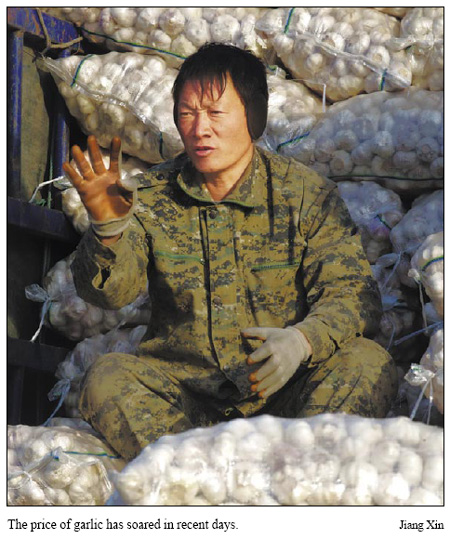Garlic, chili ineffective against A/H1N1: Officials
Despite popular belief, neither garlic nor chili is an effective weapon against A/H1N1 influenza, health officials said yesterday.
 The price of garlic - a popular flu remedy in traditional Chinese medicine - has skyrocketed by more than 500 percent this winter amid public fear about the spread of the potentially deadly virus. Recent media reports said that the demand for chili is also increasing.
The price of garlic - a popular flu remedy in traditional Chinese medicine - has skyrocketed by more than 500 percent this winter amid public fear about the spread of the potentially deadly virus. Recent media reports said that the demand for chili is also increasing.
But Wu Jiang, head of the immunity division under the Beijing Center for Disease Control and Prevention, said garlic and chili are not a cure for A/H1N1.
"There is no scientific proof that either garlic or chili is effective against the flu," Wu said during a live web cast on Qianlong.com, the municipal government-run news portal.
"The two ingredients may work for people to improve their digestive functions and stay healthy, but they are definitely not useful for curing the flu," said the official.
Yesterday, the price of garlic remained high at 7.40 yuan per 500 g at the Xinfadi market, the largest vegetable market in Beijing.
It cost less than 1 yuan per 500 g before the A/H1N1 outbreak. Chili cost about 7.50 yuan per 500 g, compared to 4 yuan earlier this year.
Liu Tong, head of Xinfadi's market department, said there are signs that the price of garlic will soon drop, the Beijing Times reported.
"It is pure rumor that red pepper farmers and sellers are stocking up on the ingredient and waiting for the prices to soar like garlic," Liu said.
"The price is rising because it needs to recover from a major drop earlier this year amid the economic slowdown."
"Pet owners should pay attention when playing with them. I would suggest people not to kiss their puppies during this particular period," Wu said during the web cast.
But the official denied that the virus was spreading among pets, including dogs.
She also said that 2.16 million people in Beijing had received A/H1N1 vaccinations by Sunday and 621 people, or three out of 10,000 cases, reported side effects.
Deng Xiaohong, vice-director and spokeswoman of the Beijing municipal bureau of health, said the number of flu victims is expected to peak during the upcoming New Year holiday.
More than 3 million vaccines are still available to residents in Beijing.
Local and foreign residents can apply by Dec 15 to receive the vaccine.
 0 Comments
0 Comments







Comments